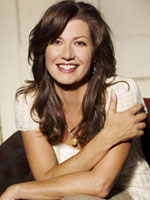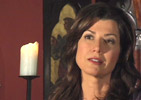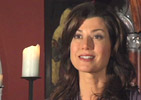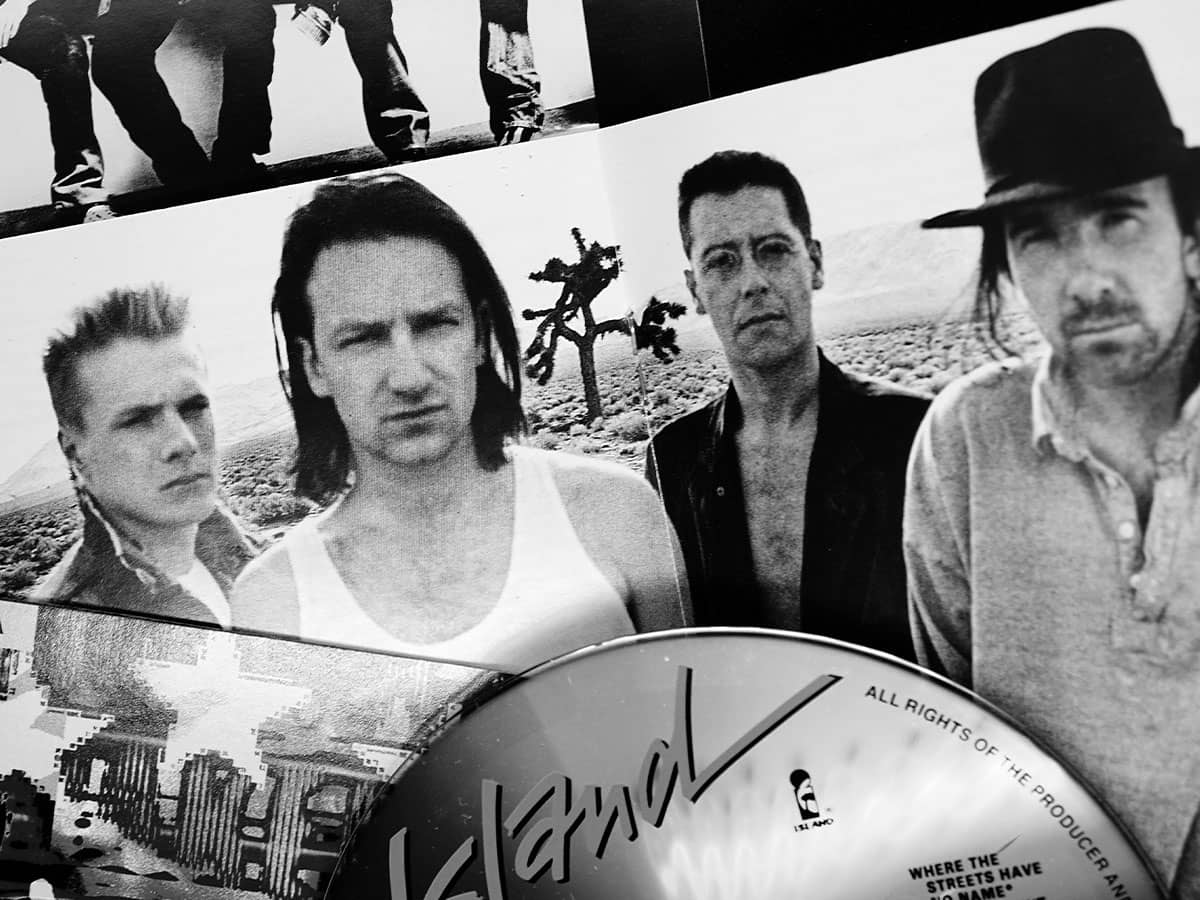
It may be hard to believe, but Grammy Award-winning music star Amy Grant is celebrating her 30th year of making music. Although some may know her best for her crossover '90s radio hits "Baby Baby" or "Heart in Motion" or her short-lived TV career hosting the reality show "Three Wishes," for most fans she is simply the Queen of Christian Pop. She recently published a collection of poetry, memories, song lyrics, and photos entitled, "Mosaic: Pieces of My Life So Far" as well as a compilation of her biggest songs, "Amy Grant: Greatest Hits." She also appears on Ann Murray's new album, "Duets: Friends & Legends," along with Carole King, Nelly Furtado, Shania Twain, and many other top female artists.
Grant, whose beauty seems to strengthen with age, sat down with Beliefnet to talk about her marriage to country singer Vince Gill, advice for today's female celebrities, battling depression, and her Christian faith. Watch video of the interview or read a longer version below.
 |

Faith, Family, and Depression |
 |
 |

Celebs, TV, Weird Moment |
 |
In today's day and age, high profile couples don't seem to last long. How do you and Vince keep your marriage strong?
Vince and I both work hard. But what matters to us is being home and spending time together. We're not out chasing the places to see and be seen. The way that we protect our relationship is to communicate. That's the most important thing. And to try to not let very many days go by—hopefully not a day go by, but at least not more than a couple of days—without really talking. "How do you feel? What's going on?" When you're married, you start a good visit and that really can lead to great romance. That's the way that you connect with somebody—we talk and enjoy that friendship and that relationship. It keeps you [both] strong.
You handled success well when you began your career—much differently than a lot of today's young, troubled female celebrities. If you could sit down with some of these girls and give them advice, what would you say?
I'd say, "Stay out of the limelight." I mean, trust me, I had my own troubles. But it was a different time then. There wasn't YouTube. There wasn't some mistake that was played over and over and over again. I made mistakes and I made bad choices, but I was protected by people who weren't using my celebrity status.
Even bad news is good news. I feel protective of young women who are celebrities today because somebody makes a decision, and then the whole world discusses it and it's a top story on the news. And I want to go, "Would you do that to your child, Mr. Anchorman? Would you want the whole world discussing your young 20-something when they screwed up?" Because we all did it. Who has not made a bad decision?
So I wish I could provide each one anonymity. And just [tell them to] take a deep breath, try to surround yourself with people who you trust, and surround yourself with people who make good decisions.
Is it wise for us to celebrate these young celebrities as much as we do? We want to know all about them and then the media covers them—and their public troubles. Isn't it sort of a vicious cycle?
I know. It's a weird cycle because we all have way too much access to each other. But I don't think you can live any life at all and not have some understanding that life is a journey.
I was coming up right when Madonna did. Of course, I sang in churches and she was really pushing the envelope as far as being a young woman in her sexuality. But we were coming up side by side. I got so sick of people asking me how I felt about Madonna's decisions. Even as a young women, in my 20s, I would say, "From what I understand, we're all on a journey. And she may or may not look back on this as a great time in her life. But, in 30 years, she's not going to be the same woman. I'm not going to be the same woman." But that was a sheltered time.
It's strange—I mean, here I am doing an interview that's going to be on the computer, but I think we're all better to turn off the technology and turn off the TV and turn off our cell phones and, instead of watching other people live their lives, live our own lives.
Get outside. Watch the sunrise. Watch the sunset. How does that make you feel? Does it make you feel big or tiny? Because there's something good about feeling both. I think the more that we think we're in touch with everybody and everything, on some very basic level, we're becoming so disconnected from our humanity. And I think that that will run its course, just like every cycle has run its course, and then it'll swing somewhere else.
Do you think that there's a home for wholesome, inspiring reality TV?
TV is part of the American way of life. And from the short run I had doing the show "Three Wishes," even before an episode was ever aired, everybody on the crew would come to work and say, "Whew! It feels so good to have a job that I don't feel guilty about." We're not humiliating anybody. It created such a great environment on the set.
I think there was a great place for a show like that. That one came and went because the network, I guess, believed in it and then didn't believe in it. But I personally got a lot of response from people walking through airports or even now—and it's been a couple of years [since it went off the air]—families will come up and say that they loved watching a program that inspired them to get involved.
What's your weirdest memory being a Christian recording artist?
I'm married to a performer. He's in country music. He spent all of his teenage years singing in bars across America and finally made it to a big stage. I started my teenage years singing in churches across America, and finally wound up on a big stage.
We talk about it now and realize we were singing to all the same people. Because at every point in our lives, we find ourselves either pursuing faith or running from it. And all of us are all those people.
What always feels weird, what makes anything weird, is when you walk into a situation and you realize there's another agenda at work there that you didn't know about.
When I was young, I would show up to sing at a church and the young pastor would pick me up and take me out to dinner and I'd think, "Oh, gosh, he hasn't had a date in five years. I'm paid to be here, so I've got to go have dinner with this guy." Or to go to a music business meeting, and you walk in and you think it's going to be a bunch of songwriters and it turns into an Amway sales pitch.
In the book you say that in many aspects of your life, you're "not a good follower." How do you free yourself up enough to follow your Christian faith?
Following when it has to do with faith, has everything to do with a relationship with Jesus. That's how we get to God. You're following nothing if you're not communicating with whoever you believe in. I feel like the older I get, the more I want to follow. When I was younger, I just thought that my plans were probably going to be more exciting than my parents' plans or the establishment. I sort of got by on being a little bit of a rebel.
I've seen a lot of life. I've traveled the world. I've met interesting people. I've had great food. I've had great sex. I've had great emotional experiences. I've had incredible art experiences. I've had incredible music experiences. And at some point, there is nothing new under the sun. The spiritual realm and the spiritual frontier is the one thing that is never, "Oh, yeah. Been there, done that."
The Bible says, "Deep calls to deep." And I feel like anybody that just gives a passing glance to faith and says, "Eh, I'm not really ready to go there yet," it's because they got all this other stuff to try. And they're going, "I think the answer is in all this other stuff." I think that it was a benefit for me to have so many doors opened so young, and to get to experience so many of the good things in life, because it made me realize that's not where the answer is.
In the book, you talk about battling depression off and on. What do you do to help yourself come out of a slump?
It's so funny what age is doing. I never thought getting older would be so great. But when it comes to depression, I have experienced less the older I've gotten. And I think part of it is, there are things that I know to look for in myself. I know winter time hits me like a ton of bricks.
My great-uncle told us when were kids, "If you're born into this family, you need to go take a brisk walk every day." He didn't know what endorphins were, but he knew that we battled that downward spiral. If I will make myself get some exercise, that always helps. And then, invest in somebody else. That's not hard when you're part of a family. Even if I'm feeling like a piece of wood, I'll wake up in the morning and I just think, "Somebody's got to put the bacon on. I will feel better about this moment if I do eggs on toast with a little melted cheese for the kids." It takes about four minutes to make breakfast for your children in the morning. You start doing little acts of getting beyond yourself. Sometimes it takes days or weeks. But you just learn there is a process to getting out of a slump.
Tiny little things that you have to do, responsibility that you can't slough off, is good when you battle depression—making lunch for your kids, or having to do laundry because nobody has clean underwear. Rather than grind your teeth over it, go, "Thank God I have got to do this little task that makes me move." And the more that [I'm] used to the rhythms of [my] own life, the more I realize, as bleak as this feels right this minute, it'll pass.
Where do you most often find God?
Either being outside or looking outside. If I can just see something that's not manmade.
There's a great window in my hotel room here [in New York City]. I wake up in the morning and I push the curtains back and just lean my face up against the glass and look at the water. You can just look up at the sky and the clouds, or look at a tree or look at a flower. Anything that's separate from human creation. If you just allow yourself to start appreciating it, you go, "This is beautiful. This compels me towards something—toward gratitude."
Tell us a bit about being the spokesperson for the “Spread the Sharing” campaign.
Spread the Sharing was launched by Country Crock. It's a brilliant campaign to get people to care about each other. You can log onto to spreadthesharing.com, and for every person that logs on and tells any storing about caring—it can be doing something for someone, giving over a parking space, sharing a smile—a meal is given to Second Harvest Food Bank of America.
What's one of the most inspirational stories you've heard on this campaign?
Well, I just love the very average [stories]. "I shared an umbrella at the track meet and had a conversation standing under the umbrella, which inspired me to share a bottle of water, which inspired me to…" There was one teenage girl and she said that she was in traffic and racing around and somebody cut in front of her and she had a negative reaction. Then she said, "I just shared a smile instead." Intentionally putting out kindness changes the world we’re in.
How do you personally celebrate the power of sharing?
I encourage sharing in myself. I'm the mother of a blended family of five. So whether or not I'm trying to be a good person, just to keep the peace you have to teach children to share. I think a life based on giving is a much more meaningful, rich life.
What are some of the challenges you have raising a blended family?
[Instead,] it really starts with the older people under the roof to raise the bar and be respectful. You cannot yell at your children and expect them to treat you with respect. That's really the challenge and the blessing of trying to invest good things in your family.



